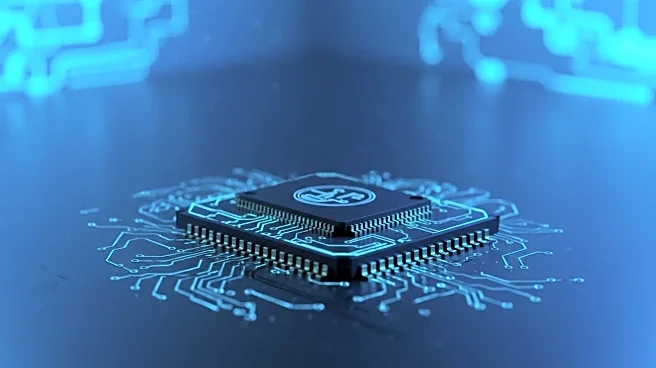What's Happening?
The Trump administration is reportedly considering acquiring a 10% stake in Intel, potentially making the U.S. government the largest shareholder in the chipmaker. This move would involve converting some or all of Intel's grants from the 2022 U.S. CHIPS and Science Act into equity. Intel has received approximately $10.9 billion in CHIPS Act grants, aimed at supporting domestic investment and semiconductor manufacturing for national security. The potential stake, valued at around $10.4 billion, reflects the administration's interest in reviving Intel's position in the global chip industry. Despite initial investor enthusiasm, the plan's traction within the administration remains uncertain, and neither Intel nor the White House has commented on the matter.
Why It's Important?
The potential acquisition of a stake in Intel by the U.S. government underscores the strategic importance of semiconductor manufacturing to national security and economic competitiveness. By becoming a major shareholder, the government could influence Intel's operations and investments, potentially accelerating advancements in chip technology. This move aligns with broader efforts to bolster U.S. leadership in the semiconductor industry, which has faced challenges from global competitors. The decision could impact Intel's market position and the allocation of CHIPS Act funds, affecting other recipients like TSMC, Samsung, and American companies such as Nvidia and Micron.
What's Next?
If the Trump administration proceeds with the stake acquisition, it could set a precedent for government involvement in strategic industries. The decision may prompt discussions among lawmakers and industry stakeholders about the role of government in private sector operations. Additionally, the conversion of grants into equity could alter the financial dynamics of the CHIPS Act, influencing future funding allocations and industry partnerships. The administration's actions may also lead to negotiations with Intel and other companies regarding the terms and implications of government ownership.
Beyond the Headlines
The potential government stake in Intel raises questions about the balance between public and private sector roles in technological innovation. It may spark debates on the ethical and economic implications of government-backed national champions, particularly in industries critical to national security. The move could also influence global perceptions of U.S. industrial policy, affecting international relations and trade dynamics in the semiconductor sector.









